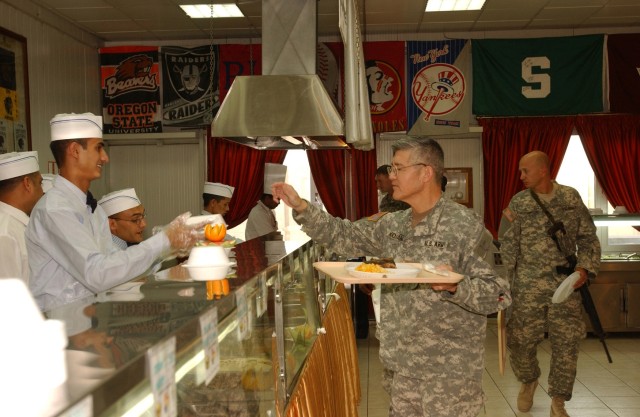
CAMP LIBERTY, Iraq (Army News Service, Oct. 23, 2006) - Napoleon Bonaparte is credited with having first uttered the famous words: "An Army travels on its stomach."
So keen was Napoleon on this idea that he held a contest to discover the best way to safely preserve food. French chef Nicolas Appert won the prize in 1809 by perfecting the first method of successfully canning food in jars - a French "military secret."
Some 200 years later, a team of just over a dozen food service Soldiers working at the Oasis, otherwise known as the Division Dining facility here, believe that Napoleon had his priorities right.
Drawn from the 4th Infantry Division's Special Troops Battalion and Fires Brigade, the dedicated DFAC workers know it is their job "to keep our fellow Soldiers fit and healthy and ready to fight," said Sgt. 1st Class Kelvin Miller, DFAC noncommissioned officer-in-charge and lead contracting officer, STB.
Miller, who will celebrate 20 years in the Army in January 2007, said he is proud of the efforts his 10 STB and four Fires Bde. food service employees have made this past year.
Far from the typical "mess hall" back home at Fort Hood, Texas, the DFAC team here also includes half a dozen civilian employees of Kellogg, Brown and Root, and more than 70 foreign national employees of the Gulf Catering Company from India, Nepal, Sri Lanka and the Philippines, all striving together under the control of the 4th Inf. Div. The team ensures that all operations are run in strict accordance with Army Regulation 30-1, "Food Service Program."
The Army system is based on a 21-day menu, which can result in repetition of foods. But Miller's staff does what it can to vary the selections and their presentation, he said, including encouraging the Indian cooks to do a special Indian food bar. Other DFACs in the Multi-National Division - Baghdad area of operations have similar "ethnic food" variations, depending on what staff works at that particular facility.
"DFACs don't normally do that," said Miller.
The foreign national employees, who staff the serving counters, cook, and bake and clean, are an example of international cooperation that few Soldiers think about in those terms, said Nancy Christiansen, food service lead, KBR, who hails from Copperas Cove, Texas.
Whether from India, Sri Lanka, Napal or the Philippines, the workers have one thing in common - a seemingly instinctive understanding of customer service and a sincere desire to do a good job, said Christiansen.
The foreign national employees have four chefs on duty at the facility, including two pastry chefs, who also try to be innovative and add color and zest to Soldiers' meals, said Staff Sgt. Ursula Anthony, from Bainbridge, Ga.
"Having a lot of areas of responsibility, we are stretched thin," said Miller. In addition to serving approximately 30,000 meals a month at the Oasis facility, the team also has the responsibility for handling "water drops" at 30 locations, amounting to delivering 60 pallets of water a week.
The DFAC also caters such special events as general staff meetings and equal opportunity events, and even does special birthday cakes, said Miller.
A sense of comradeship and cooperation among the three groups - Soldiers, civilians and foreign national employees - is the key to success, said the staff members.
"The Soldiers we work with at the DFAC are so nice and polite," said Nestor Delos Santos, who is from Manila, Philippines, and works as a dining manager. "They always try to understand every single staff member. I am really proud to be working here with Soldiers who have these kinds of principles."
Santos' facility is also responsible for feeding detainees and guards at the MND-B detainee facility nearby.
"My experience has been great. It is wonderful to work with respectful people," said Cpl. Lisa Randall, from Utica, N.Y., a cook with STB. "It will be hard to leave; we have a lot of fun and have formed close friendships - and this is a very comfortable environment in which to work."
The staff also goes out of its way to provide a special festive atmosphere for all holidays, said Randall. "This does a lot for morale."
They are also required to provide escorts for foreign national employees from ration points and track all supplies. The Oasis facility is required to keep a 12-day back-up supply of foodstuffs on hand at all times in case the trucks go down, said Miller. Hundreds of thousands of dollars of food are stored and must always be accounted for.
"There is a lot of cohesion and teamwork," among civilian and Soldiers working at the DFAC, said Anthony. "It's like we are all one big family. Not everyone is going to be pleased with everything we serve, and after a year, you are bound to see the same things all the time. But to be deployed to a wartime situation, I think this is one of the better DFACs.
"The quality of service and what the Soldiers and civilians are served is outstanding," she added.

Social Sharing